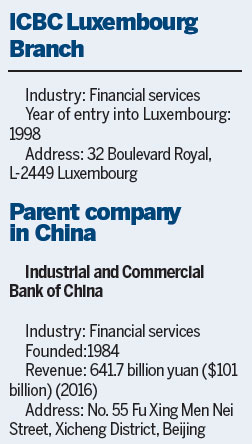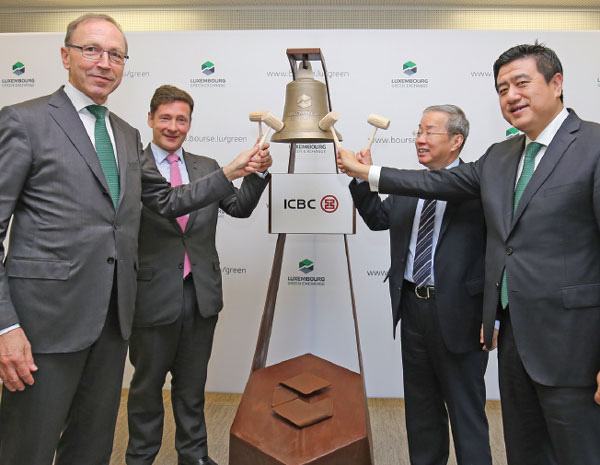Banking on success in Europe
Finance heavyweight aids China-Europe commerce and provides welcome investment opportunities
For centuries, merchants journeyed from China to Europe for months at a time - through some of the most testing landscapes in the world - trading silk, spices and perfumes. Today, thanks to modern air links, cargo planes carry merchandise from China's Zhengzhou export hub to Luxembourg every day.
This 8,000-kilometer route, dubbed the "Silk Road in the Air" was launched by the Luxembourg flagship cargo carrier Cargolux in 2017 during President Xi Jinping's meeting with Luxembourg Prime Minister Xavier Bettel in Beijing. It now carries an estimated 150,000 metric tons of cargo a year. But perhaps a lesser-known hero behind the initiative is the Industrial and Commercial Bank of China, the world's biggest bank by assets, which, through its Luxembourg branch, provided Cargolux with the financing to operate this route.
|
ICBC listed a green bond on the Luxembourg Stock Exchange in 2017, raising funds to finance environmentally friendly projects along the Belt and Road. Provided to China Daily |
"We are in a unique position to provide this financing," says Chen Fei, general manager of the ICBC Luxembourg Branch.
As a Chinese bank, ICBC is already familiar with Zhengzhou as a transportation hub that links airways and railways to many other Chinese cities. This familiarity gave it good reasons to believe that a Silk Road in the air linking Zhengzhou and Luxembourg will witness increasing cargo volumes into the future.
The bank's Luxembourg branch had already worked with Cargolux over the years on smaller projects, building up trust in Cargolux as a client.
"The combination of these two factors gave us the confidence to issue the loan to Cargolux, and trust that it will be repaid," says Chen, although the exact figure of the loan is confidential. In comparison, a Western bank less familiar with trading patterns between China and Europe might have been hesitant in issuing such a loan.
ICBC's loan to Cargolux is perhaps a good example of ICBC finding a niche in Europe. As a relative newcomer compared with banking incumbents such as HSBC, Standard Chartered and Goldman Sachs, it focuses on financing activities with a Chinese angle.

For instance, it provides financing for Chinese companies trading with European partners or making acquisitions in Europe. It also supports Chinese companies to issue bonds in Europe, raising funds from Luxembourg's deep fund pool.
So, in Chen's words, ICBC made its first steps toward expansion in Europe to "follow our clients", which are Chinese companies operating in Europe. Over the years, it has extended these same banking services to European companies working with China, such as Cargolux.
ICBC was founded in Beijng in 1984 as one of China's earliest four banks, collectively known as China's "Big Four" State-owned banks. The other three are Bank of China, Agricultural Bank of China and China Construction Bank.
Its entry into Europe started in Luxembourg in 1998 when it established a representative office, which was quickly upgraded to a branch in 1999. In 2006, ICBC established a subsidiary in Luxembourg in order to prepare for the bank's expansion to other European countries using the European Union's single passport policy.
In January 2011, ICBC established five European branches, in Paris, Amsterdam, Brussels, Milan and Madrid. At the same time, ICBC (Luxembourg) SA changed its name to ICBC (Europe) SA, to signify its position as the bank's European headquarters.
The five branches grew quickly, and all of them achieved profits in the first six months of their operation, ending in June 2011. Having achieved success, ICBC then established its Warsaw and Barcelona branches in November 2012.
In 2012, ICBC also established three centers focusing on cash management, private banking and investment banking respectively. All three are in Paris, a city frequently visited by delegations of Chinese outbound businesses.
ICBC Europe's private banking service has helped many of its existing clients, who are high-net-worth individuals, to invest in Europe. Investment options range from real estate and luxury products to acquisitions of small businesses for example, vineyards. It also helps Chinese clients manage immigration into Europe through the investment route.
In addition, ICBC also has a branch in Frankfurt and a subsidiary in London. Although both entities are managed by ICBC's head office in Beijing, they cooperate with ICBC Europe extensively for businesses on a daily basis.
Just as ICBC gradually expands with additional branches across Europe to support clients one by one at the grassroots level, China's financial services sector has undergone tremendous changes, creating great opportunities for the overseas operations of banks such as ICBC.

Following the 2008 financial crisis, China started to internationalize the renminbi, encouraging the currency's increasing use overseas for trade and investment purposes. From then on, European companies increasingly paid their Chinese partners in renminbi and issued offshore renminbi bonds to raise finance for business activities.
However, as the renminbi is not yet fully convertible, renminbi clearing banks are needed in overseas financial hubs to help investors convert their money into and out of the currency. The ICBC Luxembourg branch's long history in the country helped it to be appointed as the official Luxembourg-based clearing bank in 2014.
Ben Robinson, a senior economist at the London-based think tank Official Monetary and Financial Institutions Forum, says the trend of renminbi internationalization is a "natural fit" for ICBC's overseas activities.
He adds that creating innovative and targeted products and services is an important element supporting ICBC's internationalization process.
"Banking needs are also changing, with trade finance and corporate activities giving way to wealth management and other products," Robinson says.
"The range of new demands on banking firms by their customers creates a state of flux in which newcomers may have an advantage. ICBC's large size and market share in its traditional markets means it is in a good position to expand on these and increase its offering as it seeks to internationalize," he says.
It is precisely this strategy of offering differentiated products that ICBC has moved increasingly into in recent years.
One example is its listing of a $2.15 billion (1.73 billion euros; £1.51 billion) green bond on the Luxembourg Stock Exchange last year, raising funds to finance environmentally friendly projects along the region related to the Belt and Road Initiative.
A green bond is a new financial instrument that started in 2008, with the World Bank issuing the first one. So far, green bonds are still a minor part of the entire bond space, let alone a green bond focusing on the Belt and Road Initiative.
But despite their scarcity, green bonds became popular among investors seeking long term and stable returns, such as pension funds and sovereign wealth funds, because certified green infrastructure and energy projects adhere to stricter future climate-friendly regulations, and therefore reduce climate policy risks for investors.
Chen says he is relieved to see European funds making up about 70 percent of the investors of the Luxembourg-listed ICBC green bond, which demonstrates European investors' confidence in ICBC as an issuer and also strong demand for environmentally friendly investment products in Europe.
"By bringing such a product to market on the Luxembourg Stock Exchange, we contributed our share to help European investors find desirable investment products," Chen says.
Seventy-percent European investment is a big achievement, considering that ICBC's previous regular bonds listed on the Luxembourg Stock Exchange attracted more Asian investors.
In addition to helping European investors, developing green finance is also a mission for ICBC, considering that China is now a leader in environmental sustainability. In practice, funds raised from the ICBC green bond contribute toward this goal because they are already invested in projects relating to renewable energy, low carbon and low emission transportation, energy efficiency and sustainable water and wastewater treatment.
"Tapping the international green capital market gives us a new channel to fund projects with environmental benefits," Chen says.
cecily.liu@mail.chinadailyuk.com
(China Daily European Weekly 03/23/2018 page30)



















